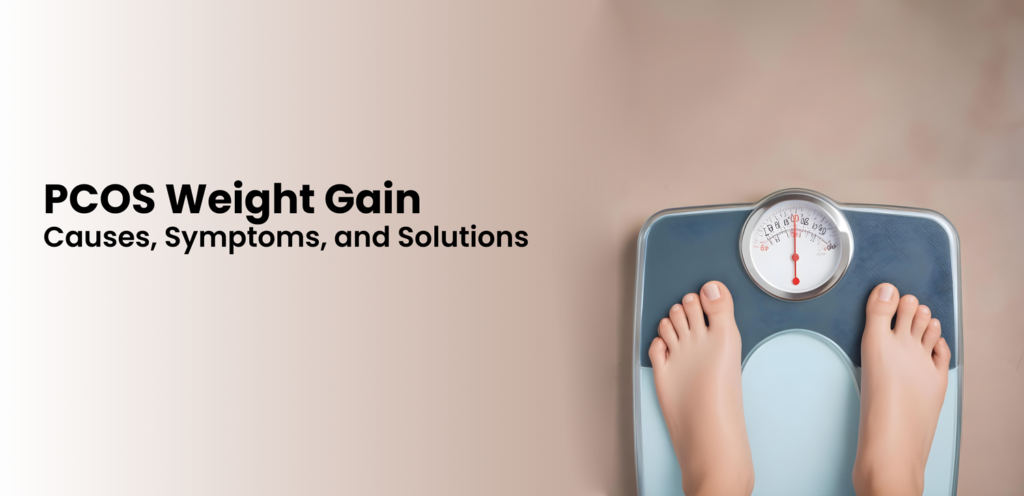
Polycystic ovary syndrome is a common hormone-related condition. It affects females of reproductive age. It has a mix of symptoms. These are irregular or absent periods, high androgens, and small cysts on the ovaries. Some with PCOS may gain weight from hormone imbalance, medications, and other factors.
Polycystic ovary syndrome (PCOS) is a hormonal disorder. Women with PCOS often have hormonal imbalances. They may also have a slower metabolism. As a result, they often face PCOS weight gain. Dietary adjustments make a significant impact on weight management.
Women with PCOS have a higher risk of fatty liver, high blood pressure, and high cholesterol. They also have higher insulin levels. Uncontrolled weight could cause heart disease, stroke, or diabetes. In this post, we will cover PCOS weight gain, their symptoms, and effective solutions.
Causes Of Polycystic Ovary Syndrome Weight Gain
With PCOS, the body has difficulty using insulin. Insulin helps the body convert sugars and carbs from food into energy. Accumulation of insulin and glucose in the blood can lead to insulin resistance.
Elevated insulin levels lead to excess production of androgens or male hormones. The symptoms are caused by an increase in androgens. These include weight gain, irregular sleep patterns, acne, and body hair. Hormones, in specific males, promote the development of abdominal fat. Usually, men take the brunt of it. Hence, women with PCOS tend to be more apple-shaped than pear-shaped.
Abdominal fat is the most dangerous kind of fat. It increases the risk of heart disease and other health issues.

Symptoms Of PCOS-Related Weight Gain
PCOS weight gain can cause common symptoms. These symptoms can vary among individuals. They may not always be present in people with weight gain due to PCOS. If you have concerns about PCOS weight gain, consult your healthcare provider. Here are the symptoms:
Abnormal Periods Or Irregular Bleeding Patterns: Irregular periods can affect some females with PCOS. Hormone changes, medications, and other factors cause this. PCOS weight gain and irregular periods are common in Polycystic ovary syndrome. If you have these symptoms, please speak with your provider.
Acne, Hair Loss Or Excessive Hair Growth: High androgen levels can cause acne, excess body hair, and hair loss. Excess hair growth or other symptoms may be PCOS. If you have noticed recent changes in weight, it could be a factor. Consult your healthcare physician before making any assumptions about a diagnosis.
Bloating Or Swelling In The Abdominal Area: PCOS weight gain is often due to high androgen levels. As a result, it is usually concentrated in the abdomen. This pattern of weight gain raises health risks more than weight gain in other areas of the body.
Other Symptoms:
1. PCOS makes it hard for people to lose weight or keep it off. PCOS may cause this difficulty. It is associated with hormonal imbalances, insulin resistance, and metabolic issues.
2. People can face Rapid weight gain. Some with PCOS may gain weight suddenly. This can be distressing and hard to manage. This is due to hormonal changes and a slower metabolism.
3. PCOS weight gain can cause an increased appetite. Emotional eating and desires for sweets might result from it. Some may struggle to control their food intake. These symptoms may be due to insulin resistance, hormone imbalances, and psychological factors. Diet changes may help manage cravings and control weight gain.
4. PCOS may cause weight gain, with more fat than muscle. This makes it hard to keep muscle mass. It can lower muscle mass. This affects body composition and metabolism.
5. Some with PCOS may gain and lose weight. These fluctuations are due to various factors. They include changes in hormone levels and insulin sensitivity.
Weight Losing Tips With Polycystic Ovary Syndrome
Not only may losing weight lower your chance of developing various ailments, but it can also improve your mood. When you have PCOS, shedding just 10% of your body weight can bring your periods back to normal. In addition, it can help alleviate some polycystic ovary symptoms.
Weight loss can increase insulin sensitivity. As a result, your chances of developing diabetes, heart disease, and other side effects of PCOS are reduced.
If you want to lose weight, consult a doctor first. In addition to weighing you, the doctor will measure your waist circumference and BMI. The body mass index, or BMI for short, is the product of your weight and height.
Your doctor may also prescribe medication. Several medications are approved for PCOS. They are birth control pills, anti-androgen drugs, and Metformin (Glucophage). The effects of male hormones are blocked by anti-androgen medicines. A medication for diabetes called metformin facilitates the body’s better usage of insulin. It also reduces testosterone production. Some research has found that it can help obese women with PCOS lose weight.
In addition to medication, healthy habits can help control your weight. Eat a high-fiber, low-sugar diet. Consume a lot of whole grains, fruits, and veggies. Steer clear of processed and high-fat foods if you want to control your blood sugar. If you’re having trouble eating healthily on your own, talk to your doctor or a dietitian.
Throughout the day, have four to six modest meals as opposed to three substantial ones. This will help control your blood sugar levels. On most, if not all, days of the week, engage in at least 30 minutes of daily exercise.
Together with your doctor, monitor your blood pressure and lipid levels. If you smoke, join a program that can help you quit.
Manage PCOS With Hormone Therapy
The most common hormonal condition in childbearing women is PCOS. It can cause fertility problems. Women with PCOS have higher male hormones. They are also insulin resistant and are overweight or obese. As a result, these women can be at a higher risk of diabetes, heart disease, sleep apnea, and uterine cancer.
Struggling with PCOS weight gain can be frustrating, but effective solutions are within reach. Direct Preventive Care’s Bioidentical Hormone Replacement Therapy (BHRT) offers a personalized approach to help you regain control of your health. By combining weight loss medication and consultations, we support you in overcoming the unique challenges of PCOS-related weight gain. Our program focuses on improving insulin sensitivity, managing hormonal imbalances, and developing sustainable lifestyle habits. With expert guidance, you can achieve your weight loss goals and reduce the risks associated with PCOS, such as diabetes and heart disease. Take the first step towards a healthier you with our comprehensive and compassionate care.














